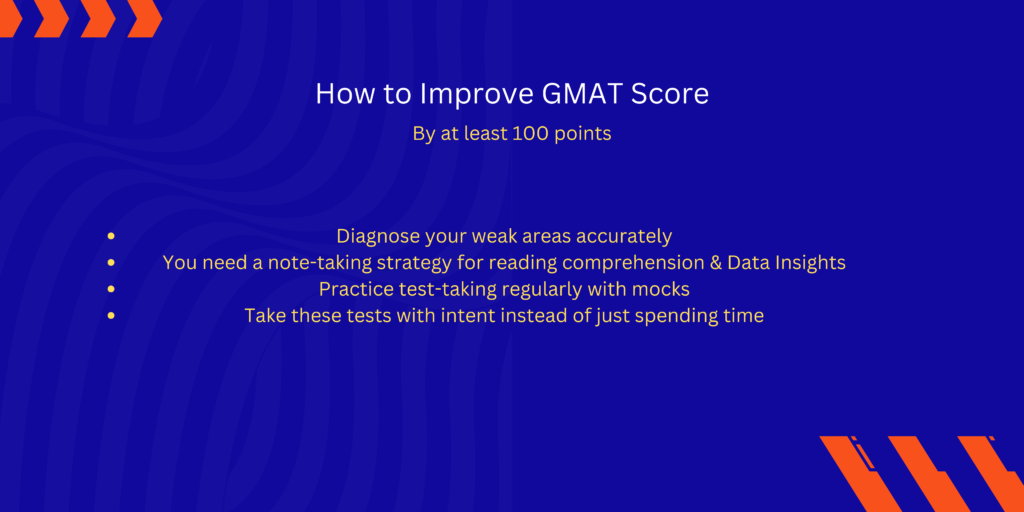From GMAT to Great: My 90-Point Journey in Two Months. This is story of a GMAT aspirant from start to end in his own words on how to increase GMAT score by almost 100 points. You can also read similar stories of score improvement here which was a 200 point improvement.
As a working professional in Southeast Asia’s consumer goods sector, I want to share my GMAT preparation story that led to a 90-point improvement while balancing a full-time job. Like many of you, I started my GMAT journey with big dreams of pursuing an MBA to accelerate my career growth.

Initial Diagnosis
Starting Point and Strategy My initial diagnostic score of 565 (V80, Q85, DI69) was a wake-up call. Despite my science background in food technology, I quickly realised that structured preparation was essential, especially with the new Focus Edition format. After thorough research, I invested in a comprehensive prep course that proved invaluable.
Breaking Through Verbal Challenges The Verbal section revealed some hard truths about my reading habits. Years of academic reading had ingrained patterns that weren’t serving me well on the GMAT. I was guilty of speed-reading without comprehension and jumping to answer choices too quickly – habits I’m sure many of you can relate to.
The Breakthrough For ~100 Points Improvement
My breakthrough came when I developed a methodical approach to Reading Comprehension. I started taking strategic notes (just 1-2 key points per paragraph) and trained myself to fully understand passages before tackling questions. This dramatically improved my accuracy on difficult passages from 35% to 65%, while reducing my time per passage by 25%. The key was learning to trust my initial understanding rather than constantly referring back to the text.
Mastering Data Insights The Data Insights section initially seemed like a mystery. Those seemingly simple graphs often hid complex relationships! I discovered that success here requires a systematic approach: always start with a quick overview of all data sources, take strategic notes for complex information, and pay extra attention to question wording. This methodology paid off wonderfully – I achieved perfect accuracy in Data Sufficiency on test day!
Time Management: The Real Challenge Even with strong quantitative skills from my science background, time management proved to be my biggest hurdle. During practice tests, I often found myself perfecting early questions at the expense of later ones. Through trial and error, I learned to maintain a steady pace and developed backup strategies for time crunches.
Mock Tests & Preparation
Mock Tests and Final Preparation My mock test scores (ranging from 555 to 665) closely mirrored my official GMAT performance. Here’s a crucial insight: your physical and mental state significantly impacts your performance. My lowest practice score came when I was unwell, reinforcing the importance of holistic preparation.
The Final Push: Test Day Test day was intense but manageable. Looking back, I wouldn’t recommend starting with Quant as I did, but I maintained focus despite time pressure and scored close to my practice test average, achieving a 655 (V84, Q80, DI83).
Advice for Fellow Aspirants For those of you starting your GMAT journey, remember:
- Be brutally honest about your weaknesses – they’re your greatest opportunities for improvement
- Focus on building strong fundamentals before advanced strategies
- Quality practice trumps quantity every time
- Don’t underestimate the importance of physical and mental preparation
- Trust your preparation process – consistency is key
I hope sharing my experience helps you in your GMAT preparation. The question of how to increase GMAT score by a 100 points is answered as the student did this while working full-time. Remember, it’s not about studying longer – it’s about studying smarter.
Feel free to reach out with questions in the comments. Everyone’s journey is unique, but I hope my experience can provide some useful insights for your own GMAT success story. This post can referred through this reddit link
